最新 高中英语阅读理解(人物故事)试题(有答案和解析)
最新高三英语阅读理解(人物故事)真题汇编(含答案)及解析

最新高三英语阅读理解(人物故事)真题汇编(含答案)及解析一、高中英语阅读理解人物故事类1.阅读理解I'd like to share a little story with you about something that happened when I was four. I remember it clearly. Our loving family dog was nearing the end of his life. My father picked him up and put him in a little bed we had made for him. Our dog, my companion, whom we had cared for, bit my father when he attempted to help him. How could he? Why? I couldn't understand it. I didn't like him anymore.I hadn't thought about that story for a long time but something that happened last week brought it back to me. I went to speak with a friend. When I knocked on the door, I met in an instant an angry look and a few harsh(尖刻的)words. When the door was slammed(砰地关上)in my face, I stood there shocked, and in a rush, I was reminded of my dog bit my father 20 years ago or so. What brought that story back was that same feeling of betrayal.Both stories taught me something the next day. You see, when I got up in the morning and was told my dog had died, it became clear to me that he must have been in great pain. For him to have bitten a family member, he could not have been himself. Much the same for the other story when I learned that my friend's wife had just left him.We are all beings of our environments, our opinions and feelings. And all of those things can cause you to say and do things that can't be understood by those who are not in the same situation with you.If you meet someone either behaving out of character or acting in a way that doesn't seem to fit the situation, put out your hand and be patient when you think it is least possible for him to do so. You may turn around a story that has a sad ending simply by your actions.(1)What is the influence of the incident mentioned in Paragraph 1?A. It hurt his father's feeling deeply.B. It has puzzled the author ever since.C. It left a deep impression on the author.D. It made the author dislike dogs.(2)Why did the author's friend say harsh words to the author?A. He was ill-tempered.B. He was suffering the pain of losing his wife.C. He was bothered by an unexpected visit.D. They once quarreled and he couldn't forgive the author.(3)What's the author's advice to us?A. Help those in need.B. Look before you leap.C. Respect for others is a kind of virtue.D. Learn to put yourself in others' shoes.【答案】(1)C(2)B(3)D【解析】【分析】本文是一篇记叙文,作者朋友因为失去妻子很痛苦以不友好的态度对待作者,使作者想起了20年前狗狗咬了父亲这件事情,从两件事情中得出了一个道理:很多因素都会影响人的行为,所以最后总结出,当我们看到别人出乎意料的行为的时候,要以理解的态度耐心的对待他人。
英语高中阅读理解(人物故事)练习题含解析
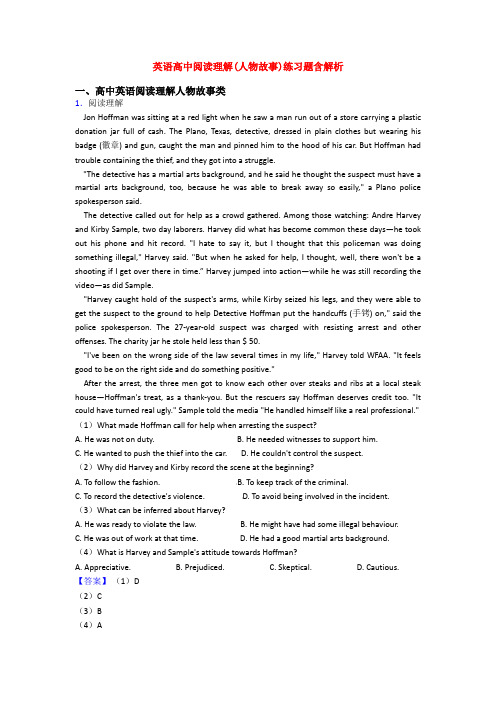
英语高中阅读理解(人物故事)练习题含解析一、高中英语阅读理解人物故事类1.阅读理解Jon Hoffman was sitting at a red light when he saw a man run out of a store carrying a plastic donation jar full of cash. The Plano, Texas, detective, dressed in plain clothes but wearing his badge (徽章) and gun, caught the man and pinned him to the hood of his car. But Hoffman had trouble containing the thief, and they got into a struggle."The detective has a martial arts background, and he said he thought the suspect must have a martial arts background, too, because he was able to break away so easily," a Plano police spokesperson said.The detective called out for help as a crowd gathered. Among those watching: Andre Harvey and Kirby Sample, two day laborers. Harvey did what has become common these days—he took out his phone and hit record. "I hate to say it, but I thought that this policeman was doing something illegal," Harvey said. "But when he asked for help, I thought, well, there won't be a shooting if I get over there in time.” Harvey jumped into action—while he was still recording the video—as did Sample."Harvey caught hold of the suspect's arms, while Kirby seized his legs, and they were able to get the suspect to the ground to help Detective Hoffman put the handcuffs (手铐) on," said the police spokesperson. The 27-year-old suspect was charged with resisting arrest and other offenses. The charity jar he stole held less than $ 50."I've been on the wrong side of the law several times in my life," Harvey told WFAA. "It feels good to be on the right side and do something positive."After the arrest, the three men got to know each other over steaks and ribs at a local steak house—Hoffman's treat, as a thank-you. But the rescuers say Hoffman deserves credit too. "It could have turned real ugly." Sample told the media "He handled himself like a real professional."(1)What made Hoffman call for help when arresting the suspect?A. He was not on duty.B. He needed witnesses to support him.C. He wanted to push the thief into the car.D. He couldn't control the suspect.(2)Why did Harvey and Kirby record the scene at the beginning?A. To follow the fashion.B. To keep track of the criminal.C. To record the detective's violence.D. To avoid being involved in the incident.(3)What can be inferred about Harvey?A. He was ready to violate the law.B. He might have had some illegal behaviour.C. He was out of work at that time.D. He had a good martial arts background.(4)What is Harvey and Sample's attitude towards Hoffman?A. Appreciative.B. Prejudiced.C. Skeptical.D. Cautious.【答案】(1)D(2)C(3)B(4)A【解析】【分析】本文是一篇记叙文,侦探Jon Hoffman在捉偷善款的小偷时遇到困难寻求帮助,Andre Harvey和 Kirby Sample帮助了他。
【英语】 英语阅读理解(人物故事)专题练习(及答案)含解析
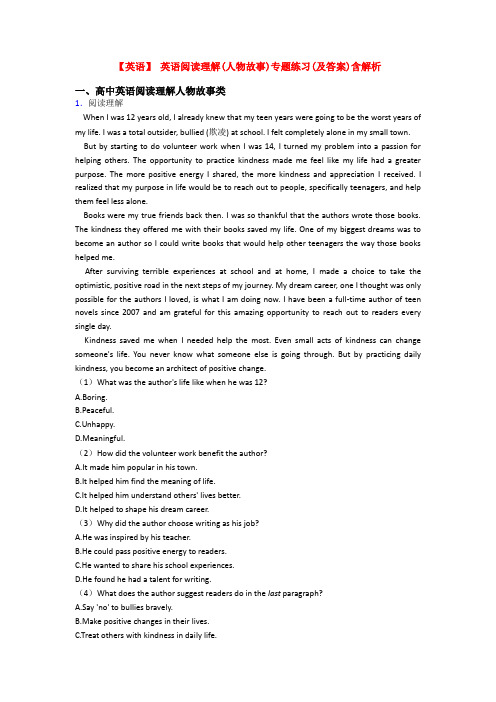
【英语】英语阅读理解(人物故事)专题练习(及答案)含解析一、高中英语阅读理解人物故事类1.阅读理解When I was 12 years old, I already knew that my teen years were going to be the worst years of my life. I was a total outsider, bullied (欺凌) at school. I felt completely alone in my small town.But by starting to do volunteer work when I was 14, I turned my problem into a passion for helping others. The opportunity to practice kindness made me feel like my life had a greater purpose. The more positive energy I shared, the more kindness and appreciation I received. I realized that my purpose in life would be to reach out to people, specifically teenagers, and help them feel less alone.Books were my true friends back then. I was so thankful that the authors wrote those books. The kindness they offered me with their books saved my life. One of my biggest dreams was to become an author so I could write books that would help other teenagers the way those books helped me.After surviving terrible experiences at school and at home, I made a choice to take the optimistic, positive road in the next steps of my journey. My dream career, one I thought was only possible for the authors I loved, is what I am doing now. I have been a full-time author of teen novels since 2007 and am grateful for this amazing opportunity to reach out to readers every single day.Kindness saved me when I needed help the most. Even small acts of kindness can change someone's life. You never know what someone else is going through. But by practicing daily kindness, you become an architect of positive change.(1)What was the author's life like when he was 12?A.Boring.B.Peaceful.C.Unhappy.D.Meaningful.(2)How did the volunteer work benefit the author?A.It made him popular in his town.B.It helped him find the meaning of life.C.It helped him understand others' lives better.D.It helped to shape his dream career.(3)Why did the author choose writing as his job?A.He was inspired by his teacher.B.He could pass positive energy to readers.C.He wanted to share his school experiences.D.He found he had a talent for writing.(4)What does the author suggest readers do in the last paragraph?A.Say 'no' to bullies bravely.B.Make positive changes in their lives.C.Treat others with kindness in daily life.D.Learn to care more about others' feelings.【答案】(1)C(2)B(3)B(4)C【解析】【分析】本文是一篇记叙文,作者讲述了自己参加志愿活动的经历,告诉人们:一次小善举也可能改变一个人的一生。
【英语】 高中英语阅读理解(人物故事)试题(有答案和解析)及解析

【英语】高中英语阅读理解(人物故事)试题(有答案和解析)及解析一、高中英语阅读理解人物故事类1.阅读理解When I was 12 years old, I already knew that my teen years were going to be the worst years of my life. I was a total outsider, bullied (欺凌) at school. I felt completely alone in my small town.But by starting to do volunteer work when I was 14, I turned my problem into a passion for helping others. The opportunity to practice kindness made me feel like my life had a greater purpose. The more positive energy I shared, the more kindness and appreciation I received. I realized that my purpose in life would be to reach out to people, specifically teenagers, and help them feel less alone.Books were my true friends back then. I was so thankful that the authors wrote those books. The kindness they offered me with their books saved my life. One of my biggest dreams was to become an author so I could write books that would help other teenagers the way those books helped me.After surviving terrible experiences at school and at home, I made a choice to take the optimistic, positive road in the next steps of my journey. My dream career, one I thought was only possible for the authors I loved, is what I am doing now. I have been a full-time author of teen novels since 2007 and am grateful for this amazing opportunity to reach out to readers every single day.Kindness saved me when I needed help the most. Even small acts of kindness can change someone's life. You never know what someone else is going through. But by practicing daily kindness, you become an architect of positive change.(1)What was the author's life like when he was 12?A.Boring.B.Peaceful.C.Unhappy.D.Meaningful.(2)How did the volunteer work benefit the author?A.It made him popular in his town.B.It helped him find the meaning of life.C.It helped him understand others' lives better.D.It helped to shape his dream career.(3)Why did the author choose writing as his job?A.He was inspired by his teacher.B.He could pass positive energy to readers.C.He wanted to share his school experiences.D.He found he had a talent for writing.(4)What does the author suggest readers do in the last paragraph?A.Say 'no' to bullies bravely.B.Make positive changes in their lives.C.Treat others with kindness in daily life.D.Learn to care more about others' feelings.【答案】(1)C(2)B(3)B(4)C【解析】【分析】本文是一篇记叙文,作者讲述了自己参加志愿活动的经历,告诉人们:一次小善举也可能改变一个人的一生。
最新 高中英语阅读理解(人物故事)试题(有答案和解析)及解析
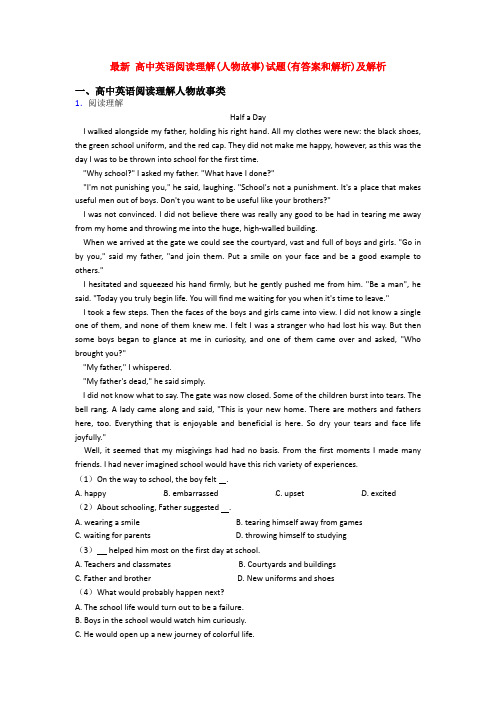
最新高中英语阅读理解(人物故事)试题(有答案和解析)及解析一、高中英语阅读理解人物故事类1.阅读理解Half a DayI walked alongside my father, holding his right hand. All my clothes were new: the black shoes, the green school uniform, and the red cap. They did not make me happy, however, as this was the day I was to be thrown into school for the first time."Why school?" I asked my father. "What have I done?""I'm not punishing you," he said, laughing. "School's not a punishment. It's a place that makes useful men out of boys. Don't you want to be useful like your brothers?"I was not convinced. I did not believe there was really any good to be had in tearing me away from my home and throwing me into the huge, high-walled building.When we arrived at the gate we could see the courtyard, vast and full of boys and girls. "Go in by you," said my father, "and join them. Put a smile on your face and be a good example to others."I hesitated and squeezed his hand firmly, but he gently pushed me from him. "Be a man", he said. "Today you truly begin life. You will find me waiting for you when it's time to leave."I took a few steps. Then the faces of the boys and girls came into view. I did not know a single one of them, and none of them knew me. I felt I was a stranger who had lost his way. But then some boys began to glance at me in curiosity, and one of them came over and asked, "Who brought you?""My father," I whispered."My father's dead," he said simply.I did not know what to say. The gate was now closed. Some of the children burst into tears. The bell rang. A lady came along and said, "This is your new home. There are mothers and fathers here, too. Everything that is enjoyable and beneficial is here. So dry your tears and face life joyfully."Well, it seemed that my misgivings had had no basis. From the first moments I made many friends. I had never imagined school would have this rich variety of experiences.(1)On the way to school, the boy felt .A. happyB. embarrassedC. upsetD. excited(2)About schooling, Father suggested .A. wearing a smileB. tearing himself away from gamesC. waiting for parentsD. throwing himself to studying(3) helped him most on the first day at school.A. Teachers and classmatesB. Courtyards and buildingsC. Father and brotherD. New uniforms and shoes(4)What would probably happen next?A. The school life would turn out to be a failure.B. Boys in the school would watch him curiously.C. He would open up a new journey of colorful life.D. His parents would accompany him at the school.【答案】(1)C(2)A(3)A(4)C【解析】【分析】本文是一篇记叙文,作者第一天去学校的时候并不开心,但是等他到了学校之后,他结交了很多朋友,开始了新的生活。
(英语)高三英语阅读理解(人物故事)试题(有答案和解析)及解析

(英语)高三英语阅读理解(人物故事)试题(有答案和解析)及解析一、高中英语阅读理解人物故事类1.阅读理解A thrilling polar competition between two adventurers to cross Antarctica alone, unsupported and unassisted had a happy ending with both explorers achieving the unprecedented feat (功绩). American professional athlete Colin O'Brady and British Army Captain Louis Rudd set off a mile apart at the same time on November 3, 2018, from the Atlantic coast with the aim to become the first person to ski across the remote continent alone.Louis Rudd maintained the lead at first. However, O'Brady caught up with Rudd on November10 and never let the British man get close to him again. O'Brady was the first to conquer the 930 mile icy land, arriving at the Ross Ice Shelf on the Pacific coast by way of the South Pole on December 26, 2018. The 33-year-old spent 54 days skiing the world's coldest continent while pulling a 300-pound sled(雪橇) with supplies.Instead of leaving the harsh environment after completing the historic adventure, the explorer set up a tent on the world's largest ice sheet and waited patiently for Rudd to complete the great undertaking. On December 29, just three days after O'Brady arrived, the British explorer finished his adventure, becoming the world's second person to complete the solo crossing of the frozen continent.Rudd was not disappointed at being second since he never considered it to be a "race". Besides, the 49-year-old British Army Captain had a more selfless motive for attempting the feat. He was doing it in memory of his friend Henry Worsley, who had introduced him to polar exploration. The disaster happened while Worsley was trying to cross the continent alone in 2016. Rudd said, "I didn't want to get drawn into a race. All that mattered to me was that I completed it, and that I skied solo and unsupported, carrying the flag with Henry's name on it."After spending a few days camping 10 feet away from each other, the two adventurers were picked up by a helicopter to the South Pole scientific research station.(1)What do Colin O'Brady and Louis Rudd have in common?A. They became the first explorers to cross Antarctica alone, unaided.B. They became the first adventurers to ski across Antarctica.C. This is the first time that they have arrived at the South pole.D. They crossed Antarctica in honor of their friend Henry Worsley.(2)What do you know about the first leg(第一段賽程) of the race?A. O'Brady skied along with Louis Rudd side by side.B. O'Brady's sled with food supplies broke down.C. Louis Rudd lost the tag with Henry's name on it.D. O'Brady fell behind Louis Rudd for the first week.(3)What can we infer about Henry Worsley?A. He used to encourage O' Brady to explore the Antarctic.B. He lost his life in a terrible traffic accident in 2016.C. He died while he was attempting to cross the Antarctic alone.D. He helped Louis Rudd complete the historic adventure.(4)How did the two adventurers return to the South Pole scientific research station? A. On foot. B. By air. C. By land. D. By water.【答案】(1)A(2)D(3)C(4)B【解析】【分析】本文是一篇记叙文,两个冒险家在无人帮助的情况下独自滑雪穿越南极大陆,但是两个人的目的不同。
最新 高考英语阅读理解(人物故事)专项训练100(附答案)含解析

最新高考英语阅读理解(人物故事)专项训练100(附答案)含解析一、高中英语阅读理解人物故事类1.阅读理解When I was 12 years old, I already knew that my teen years were going to be the worst years of my life. I was a total outsider, bullied (欺凌) at school. I felt completely alone in my small town.But by starting to do volunteer work when I was 14, I turned my problem into a passion for helping others. The opportunity to practice kindness made me feel like my life had a greater purpose. The more positive energy I shared, the more kindness and appreciation I received. I realized that my purpose in life would be to reach out to people, specifically teenagers, and help them feel less alone.Books were my true friends back then. I was so thankful that the authors wrote those books. The kindness they offered me with their books saved my life. One of my biggest dreams was to become an author so I could write books that would help other teenagers the way those books helped me.After surviving terrible experiences at school and at home, I made a choice to take the optimistic, positive road in the next steps of my journey. My dream career, one I thought was only possible for the authors I loved, is what I am doing now. I have been a full-time author of teen novels since 2007 and am grateful for this amazing opportunity to reach out to readers every single day.Kindness saved me when I needed help the most. Even small acts of kindness can change someone's life. You never know what someone else is going through. But by practicing daily kindness, you become an architect of positive change.(1)What was the author's life like when he was 12?A.Boring.B.Peaceful.C.Unhappy.D.Meaningful.(2)How did the volunteer work benefit the author?A.It made him popular in his town.B.It helped him find the meaning of life.C.It helped him understand others' lives better.D.It helped to shape his dream career.(3)Why did the author choose writing as his job?A.He was inspired by his teacher.B.He could pass positive energy to readers.C.He wanted to share his school experiences.D.He found he had a talent for writing.(4)What does the author suggest readers do in the last paragraph?A.Say 'no' to bullies bravely.B.Make positive changes in their lives.C.Treat others with kindness in daily life.D.Learn to care more about others' feelings.【答案】(1)C(2)B(3)B(4)C【解析】【分析】本文是一篇记叙文,作者讲述了自己参加志愿活动的经历,告诉人们:一次小善举也可能改变一个人的一生。
高中英语阅读理解(人物故事)练习题及解析
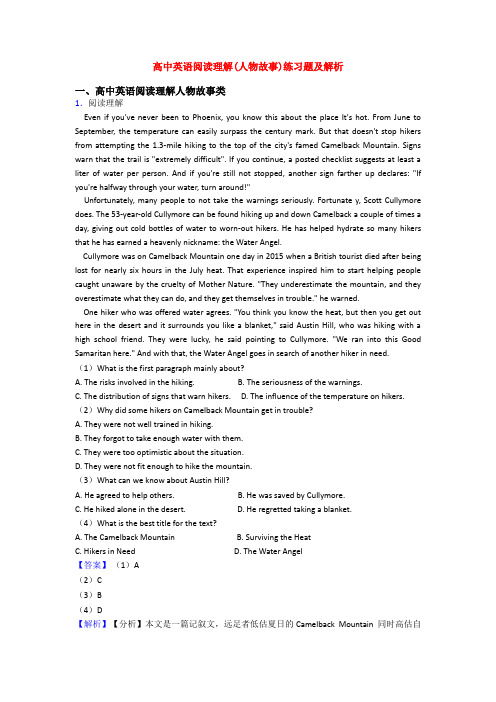
高中英语阅读理解(人物故事)练习题及解析一、高中英语阅读理解人物故事类1.阅读理解Even if you've never been to Phoenix, you know this about the place It's hot. From June to September, the temperature can easily surpass the century mark. But that doesn't stop hikers from attempting the 1.3-mile hiking to the top of the city's famed Camelback Mountain. Signs warn that the trail is "extremely difficult". If you continue, a posted checklist suggests at least a liter of water per person. And if you're still not stopped, another sign farther up declares: "If you're halfway through your water, turn around!"Unfortunately, many people to not take the warnings seriously. Fortunate y, Scott Cullymore does. The 53-year-old Cullymore can be found hiking up and down Camelback a couple of times a day, giving out cold bottles of water to worn-out hikers. He has helped hydrate so many hikers that he has earned a heavenly nickname: the Water Angel.Cullymore was on Camelback Mountain one day in 2015 when a British tourist died after being lost for nearly six hours in the July heat. That experience inspired him to start helping people caught unaware by the cruelty of Mother Nature. "They underestimate the mountain, and they overestimate what they can do, and they get themselves in trouble." he warned.One hiker who was offered water agrees. "You think you know the heat, but then you get out here in the desert and it surrounds you like a blanket," said Austin Hill, who was hiking with a high school friend. They were lucky, he said pointing to Cullymore. "We ran into this Good Samaritan here." And with that, the Water Angel goes in search of another hiker in need.(1)What is the first paragraph mainly about?A. The risks involved in the hiking.B. The seriousness of the warnings.C. The distribution of signs that warn hikers.D. The influence of the temperature on hikers.(2)Why did some hikers on Camelback Mountain get in trouble?A. They were not well trained in hiking.B. They forgot to take enough water with them.C. They were too optimistic about the situation.D. They were not fit enough to hike the mountain.(3)What can we know about Austin Hill?A. He agreed to help others.B. He was saved by Cullymore.C. He hiked alone in the desert.D. He regretted taking a blanket.(4)What is the best title for the text?A. The Camelback MountainB. Surviving the HeatC. Hikers in NeedD. The Water Angel【答案】(1)A(2)C(3)B(4)D【解析】【分析】本文是一篇记叙文,远足者低估夏日的Camelback Mountain 同时高估自己的能力,所以在远足途中遇到麻烦,Cullymore了解情况后决定帮助他们。
高中英语阅读理解(人物故事)试题(有答案和解析)及解析

高中英语阅读理解(人物故事)试题(有答案和解析)及解析一、高中英语阅读理解人物故事类1.阅读理解Arthur Dubois isn't your typical grandfather. That's because at 72 years old, the Chicago resident is a newly discovered hip-hop artist.This week, Dubois walked into Haven Studios, a music program on the South Side of Chicago that supports young ambitious artists. The owner of Haven Studios, Andre "Add-2" Daniels, said Dubois claimed he was "young at heart." So, Daniels decided to listen to Dubois' music. He was completely floored. Daniels quickly took videos showcasing Dubois' talents and posted them to Twitter. His tweet went viral, receiving thousands of reactions within a matter of days. Now, Dubois' talents have even caught the attention of some famous hip-hop producers."It's not what you would expect, right?" Daniels says in one of the videos. Dubois music is playing in the background, giving a steady beat that easily invites listeners to dance.Dubois said his style was entirely self-taught. He first started teaching himself to produce hip-hop beats about six years ago, after he retired. "I found something to do," he told NPR's Scott Simon. "I had to learn how to do the computer and music at the same time." Dubois taught himself by using the audio editing software. Now he's learning another new skill-social media. Dubois' newfound social media fame has been a little overwhelming for him. "I was shocked," he said. "I broke down and cried because I didn't know that many people liked me." Daniels has helped Dubois set up accounts on Twitter and Instagram for his fans to follow, "I'd never used Instargram, Twitter and all that other stuff," Dubois said. "Because I didn't believe in that stuff myself. But now I've got to have it." The attention doesn't seem to have gone to Dubois' head though-he doesn't really care about getting famous or making money. "I just want to put it out there and let other people hear my music."(1)What does the underlined word "floored" in Paragraph 2 mean?A. Astonished.B. Scared.C. Nervous.D. Hurt.(2)Who helped Dubois take up hip-hop?A. Daniels.B. He himself.C. NPR's Scott Simon.D. Hip-hop producers.(3)What can we infer from the text?A. Daniels set up accounts for Dubois.B. Daniels didn't enjoy Dubois' music at first.C. Dubois seeks for personal fame and wealth.D. Dubois didn't expect his popularity on the Internet.(4)What can we conclude from the passage?A. Well begun in half done.B. It's never too late to learn.C. Lost time in never found again.D. One good turn deserves another.【答案】(1)A(2)B(3)D(4)B【解析】【分析】本文是一篇记叙文,72岁的爷爷Dubois自学嘻哈音乐,并在网上拥有大量的粉丝。
高中英语阅读理解(人物故事)试题(有答案和解析)含解析
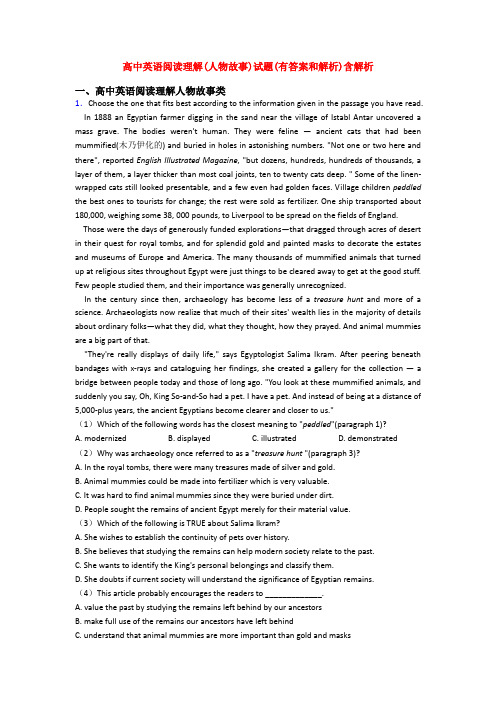
高中英语阅读理解(人物故事)试题(有答案和解析)含解析一、高中英语阅读理解人物故事类1.Choose the one that fits best according to the information given in the passage you have read. In 1888 an Egyptian farmer digging in the sand near the village of Istabl Antar uncovered a mass grave. The bodies weren't human. They were feline —ancient cats that had been mummified(木乃伊化的) and buried in holes in astonishing numbers. "Not one or two here and there", reported English Illustrated Magazine, "but dozens, hundreds, hundreds of thousands, a layer of them, a layer thicker than most coal joints, ten to twenty cats deep. " Some of the linen-wrapped cats still looked presentable, and a few even had golden faces. Village children peddled the best ones to tourists for change; the rest were sold as fertilizer. One ship transported about 180,000, weighing some 38, 000 pounds, to Liverpool to be spread on the fields of England.Those were the days of generously funded explorations—that dragged through acres of desert in their quest for royal tombs, and for splendid gold and painted masks to decorate the estates and museums of Europe and America. The many thousands of mummified animals that turned up at religious sites throughout Egypt were just things to be cleared away to get at the good stuff. Few people studied them, and their importance was generally unrecognized.In the century since then, archaeology has become less of a treasure hunt and more of a science. Archaeologists now realize that much of their sites' wealth lies in the majority of details about ordinary folks—what they did, what they thought, how they prayed. And animal mummies are a big part of that."They're really displays of daily life," says Egyptologist Salima Ikram. After peering beneath bandages with x-rays and cataloguing her findings, she created a gallery for the collection — a bridge between people today and those of long ago. "You look at these mummified animals, and suddenly you say, Oh, King So-and-So had a pet. I have a pet. And instead of being at a distance of 5,000-plus years, the ancient Egyptians become clearer and closer to us."(1)Which of the following words has the closest meaning to "peddled"(paragraph 1)? A. modernized B. displayed C. illustrated D. demonstrated(2)Why was archaeology once referred to as a "treasure hunt "(paragraph 3)?A. In the royal tombs, there were many treasures made of silver and gold.B. Animal mummies could be made into fertilizer which is very valuable.C. It was hard to find animal mummies since they were buried under dirt.D. People sought the remains of ancient Egypt merely for their material value.(3)Which of the following is TRUE about Salima Ikram?A. She wishes to establish the continuity of pets over history.B. She believes that studying the remains can help modern society relate to the past.C. She wants to identify the King's personal belongings and classify them.D. She doubts if current society will understand the significance of Egyptian remains.(4)This article probably encourages the readers to _____________.A. value the past by studying the remains left behind by our ancestorsB. make full use of the remains our ancestors have left behindC. understand that animal mummies are more important than gold and masksD. become more sensitive to the ancient lifestyle of our ancestors【答案】(1)B(2)D(3)B(4)A【解析】【分析】本文是一篇记叙文,自从1888年在埃及发现了猫动物的木乃伊之后,大量的皇家墓穴被挖掘,成千上万的木乃伊被运往世界各地,以攫取物质利益。
高中英语阅读理解(人物故事)试题(有答案和解析).docx
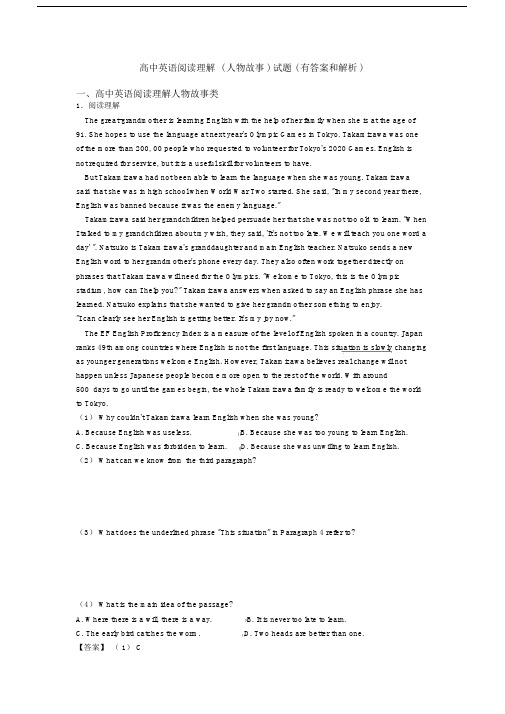
高中英语阅读理解 ( 人物故事 ) 试题 ( 有答案和解析 )一、高中英语阅读理解人物故事类1.阅读理解The great-grandmother is learning English with the help of her family when she is at the age of 91.She hopes to use the language at next year's Olympic Games in Tokyo. Takamizawa was one of the more than 200, 00 people who requested to volunteer for Tokyo's 2020 Games. English is not required for service, but it is a useful skill for volunteers to have.But Takamizawa had not been able to learn the language when she was young. Takamizawa said that she was in high school when World War Two started. She said, "In my second year there, English was banned because it was the enemy language."Takamizawa said her grandchildren helped persuade her that she was not too old to learn. "When I talked to my grandchildren about my wish, they said, 'It's not too late. We will teach you one word a day' ". Natsuko is Takamizawa's granddaughter and main English teacher. Natsuko sends a new English word to her grandmother's phone every day. They also often work together directly on phrases that Takamizawa will need for the Olympics. "Welcome to Tokyo, this is the Olympic stadium, how can I help you?" Takamizawa answers when asked to say an English phrase she has learned. Natsuko explains that she wanted to give her grandmother something to enjoy."I can clearly see her English is getting better. It's my joy now."The EF English Proficiency Index is a measure of the level of English spoken in a country. Japan ranks 49th among countries where English is not the first language. This situation is slowly changing as younger generations welcome English. However, Takamizawa believes real change will not happen unless Japanese people become more open to the rest of the world. With around500days to go until the games begin, the whole Takamizawa family is ready to welcome the world to Tokyo.(1) Why couldn't Takamizawa learn English when she was young?A. Because English was useless.B. Because she was too young to learn English.C. Because English was forbidden to learn.D. Because she was unwilling to learn English.(2) What can we know from the third paragraph?(3) What does the underlined phrase "This situation" in Paragraph 4 refer to?(4) What is the main idea of the passage?A. Where there is a will, there is a way.B. It is never too late to learn.C. The early bird catches the worm.D. Two heads are better than one.【答案】( 1) C(2) A(3) B(4) B【解析】【分析】本文是一篇记叙文,日本91 岁的奶奶Takamizawa 为了做好迎接在东京举行的2020奥运会的志愿工作,在孙辈的鼓励和帮助下开始学习英语。
最新高一英语阅读理解(人物故事)试题(有答案和解析)及解析
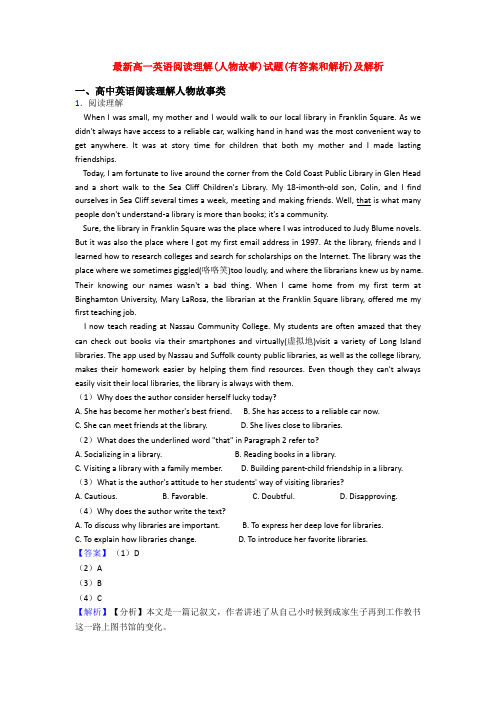
最新高一英语阅读理解(人物故事)试题(有答案和解析)及解析一、高中英语阅读理解人物故事类1.阅读理解When I was small, my mother and I would walk to our local library in Franklin Square. As we didn't always have access to a reliable car, walking hand in hand was the most convenient way to get anywhere. It was at story time for children that both my mother and I made lasting friendships.Today, I am fortunate to live around the corner from the Cold Coast Public Library in Glen Head and a short walk to the Sea Cliff Children's Library. My 18-imonth-old son, Colin, and I find ourselves in Sea Cliff several times a week, meeting and making friends. Well, that is what many people don't understand-a library is more than books; it's a community.Sure, the library in Franklin Square was the place where I was introduced to Judy Blume novels. But it was also the place where I got my first email address in 1997. At the library, friends and I learned how to research colleges and search for scholarships on the Internet. The library was the place where we sometimes giggled(咯咯笑)too loudly, and where the librarians knew us by name. Their knowing our names wasn't a bad thing. When I came home from my first term at Binghamton University, Mary LaRosa, the librarian at the Franklin Square library, offered me my first teaching job.I now teach reading at Nassau Community College. My students are often amazed that they can check out books via their smartphones and virtually(虚拟地)visit a variety of Long Island libraries. The app used by Nassau and Suffolk county public libraries, as well as the college library, makes their homework easier by helping them find resources. Even though they can't always easily visit their local libraries, the library is always with them.(1)Why does the author consider herself lucky today?A. She has become her mother's best friend.B. She has access to a reliable car now.C. She can meet friends at the library.D. She lives close to libraries.(2)What does the underlined word "that" in Paragraph 2 refer to?A. Socializing in a library.B. Reading books in a library.C. Visiting a library with a family member.D. Building parent-child friendship in a library.(3)What is the author's attitude to her students' way of visiting libraries?A. Cautious.B. Favorable.C. Doubtful.D. Disapproving.(4)Why does the author write the text?A. To discuss why libraries are important.B. To express her deep love for libraries.C. To explain how libraries change.D. To introduce her favorite libraries.【答案】(1)D(2)A(3)B(4)C【解析】【分析】本文是一篇记叙文,作者讲述了从自己小时候到成家生子再到工作教书这一路上图书馆的变化。
高考英语阅读理解(人物故事)试题(有答案和解析)
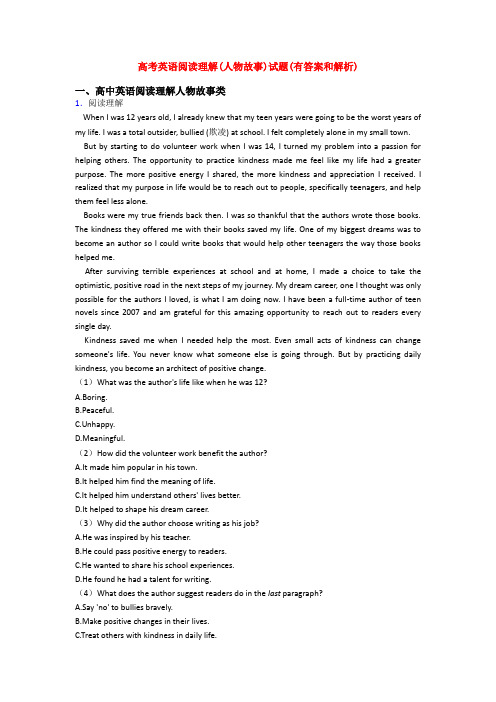
高考英语阅读理解(人物故事)试题(有答案和解析)一、高中英语阅读理解人物故事类1.阅读理解When I was 12 years old, I already knew that my teen years were going to be the worst years of my life. I was a total outsider, bullied (欺凌) at school. I felt completely alone in my small town.But by starting to do volunteer work when I was 14, I turned my problem into a passion for helping others. The opportunity to practice kindness made me feel like my life had a greater purpose. The more positive energy I shared, the more kindness and appreciation I received. I realized that my purpose in life would be to reach out to people, specifically teenagers, and help them feel less alone.Books were my true friends back then. I was so thankful that the authors wrote those books. The kindness they offered me with their books saved my life. One of my biggest dreams was to become an author so I could write books that would help other teenagers the way those books helped me.After surviving terrible experiences at school and at home, I made a choice to take the optimistic, positive road in the next steps of my journey. My dream career, one I thought was only possible for the authors I loved, is what I am doing now. I have been a full-time author of teen novels since 2007 and am grateful for this amazing opportunity to reach out to readers every single day.Kindness saved me when I needed help the most. Even small acts of kindness can change someone's life. You never know what someone else is going through. But by practicing daily kindness, you become an architect of positive change.(1)What was the author's life like when he was 12?A.Boring.B.Peaceful.C.Unhappy.D.Meaningful.(2)How did the volunteer work benefit the author?A.It made him popular in his town.B.It helped him find the meaning of life.C.It helped him understand others' lives better.D.It helped to shape his dream career.(3)Why did the author choose writing as his job?A.He was inspired by his teacher.B.He could pass positive energy to readers.C.He wanted to share his school experiences.D.He found he had a talent for writing.(4)What does the author suggest readers do in the last paragraph?A.Say 'no' to bullies bravely.B.Make positive changes in their lives.C.Treat others with kindness in daily life.D.Learn to care more about others' feelings.【答案】(1)C(2)B(3)B(4)C【解析】【分析】本文是一篇记叙文,作者讲述了自己参加志愿活动的经历,告诉人们:一次小善举也可能改变一个人的一生。
最新高三英语阅读理解(人物故事)题20套(带答案)含解析
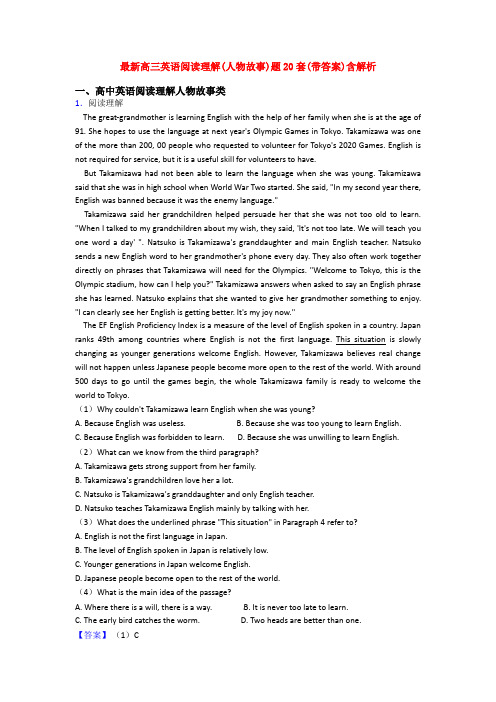
最新高三英语阅读理解(人物故事)题20套(带答案)含解析一、高中英语阅读理解人物故事类1.阅读理解The great-grandmother is learning English with the help of her family when she is at the age of 91. She hopes to use the language at next year's Olympic Games in Tokyo. Takamizawa was one of the more than 200, 00 people who requested to volunteer for Tokyo's 2020 Games. English is not required for service, but it is a useful skill for volunteers to have.But Takamizawa had not been able to learn the language when she was young. Takamizawa said that she was in high school when World War Two started. She said, "In my second year there, English was banned because it was the enemy language."Takamizawa said her grandchildren helped persuade her that she was not too old to learn. "When I talked to my grandchildren about my wish, they said, 'It's not too late. We will teach you one word a day' ". Natsuko is Takamizawa's granddaughter and main English teacher. Natsuko sends a new English word to her grandmother's phone every day. They also often work together directly on phrases that Takamizawa will need for the Olympics. "Welcome to Tokyo, this is the Olympic stadium, how can I help you?" Takamizawa answers when asked to say an English phrase she has learned. Natsuko explains that she wanted to give her grandmother something to enjoy. "I can clearly see her English is getting better. It's my joy now."The EF English Proficiency Index is a measure of the level of English spoken in a country. Japan ranks 49th among countries where English is not the first language. This situation is slowly changing as younger generations welcome English. However, Takamizawa believes real change will not happen unless Japanese people become more open to the rest of the world. With around 500 days to go until the games begin, the whole Takamizawa family is ready to welcome the world to Tokyo.(1)Why couldn't Takamizawa learn English when she was young?A. Because English was useless.B. Because she was too young to learn English.C. Because English was forbidden to learn.D. Because she was unwilling to learn English.(2)What can we know from the third paragraph?A. Takamizawa gets strong support from her family.B. Takamizawa's grandchildren love her a lot.C. Natsuko is Takamizawa's granddaughter and only English teacher.D. Natsuko teaches Takamizawa English mainly by talking with her.(3)What does the underlined phrase "This situation" in Paragraph 4 refer to?A. English is not the first language in Japan.B. The level of English spoken in Japan is relatively low.C. Younger generations in Japan welcome English.D. Japanese people become open to the rest of the world.(4)What is the main idea of the passage?A. Where there is a will, there is a way.B. It is never too late to learn.C. The early bird catches the worm.D. Two heads are better than one.【答案】(1)C(2)A(3)B(4)B【解析】【分析】本文是一篇记叙文,日本91岁的奶奶Takamizawa为了做好迎接在东京举行的2020奥运会的志愿工作,在孙辈的鼓励和帮助下开始学习英语。
高三英语阅读理解(人物故事)题20套(带答案)含解析
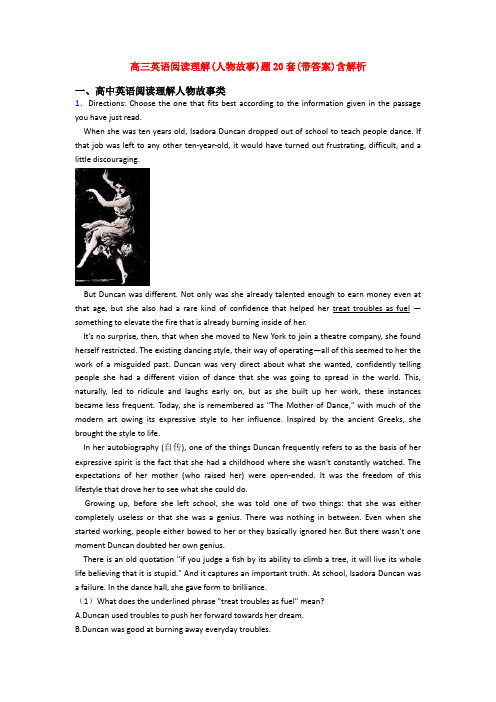
高三英语阅读理解(人物故事)题20套(带答案)含解析一、高中英语阅读理解人物故事类1.Directions: Choose the one that fits best according to the information given in the passage you have just read.When she was ten years old, Isadora Duncan dropped out of school to teach people dance. If that job was left to any other ten-year-old, it would have turned out frustrating, difficult, and a little discouraging.But Duncan was different. Not only was she already talented enough to earn money even at that age, but she also had a rare kind of confidence that helped her treat troubles as fuel —something to elevate the fire that is already burning inside of her.It's no surprise, then, that when she moved to New York to join a theatre company, she found herself restricted. The existing dancing style, their way of operating—all of this seemed to her the work of a misguided past. Duncan was very direct about what she wanted, confidently telling people she had a different vision of dance that she was going to spread in the world. This, naturally, led to ridicule and laughs early on, but as she built up her work, these instances became less frequent. Today, she is remembered as "The Mother of Dance," with much of the modern art owing its expressive style to her influence. Inspired by the ancient Greeks, she brought the style to life.In her autobiography (自传), one of the things Duncan frequently refers to as the basis of her expressive spirit is the fact that she had a childhood where she wasn't constantly watched. The expectations of her mother (who raised her) were open-ended. It was the freedom of this lifestyle that drove her to see what she could do.Growing up, before she left school, she was told one of two things: that she was either completely useless or that she was a genius. There was nothing in between. Even when she started working, people either bowed to her or they basically ignored her. But there wasn't one moment Duncan doubted her own genius.There is an old quotation "if you judge a fish by its ability to climb a tree, it will live its whole life believing that it is stupid." And it captures an important truth. At school, Isadora Duncan was a failure. In the dance hall, she gave form to brilliance.(1)What does the underlined phrase "treat troubles as fuel" mean?A.Duncan used troubles to push her forward towards her dream.B.Duncan was good at burning away everyday troubles.C.Troubles turned Duncan into a confident girl.D.Troubles lit the fire of dancing in Duncan.(2)Which of the following is TRUE about Duncan?A.Her experience in New York was the foundation of her career.B.Her teaching job when she was little destroyed her confidence.C.Her dancing style was not very well received at the beginning.D.Her mother set higher expectation on her than she could bear.(3)What does the author try to tell the readers in the last paragraph?A.It is useless climbing a tree to catch fish.B.Everybody is a genius in his own way.C.Miseries come from human stupidity.D.Teachers can impact students greatly.(4)What is this passage mainly about?A.Isadora Duncan's childhood and her achievements today.B.Duncan's career development and other dancers' opinions of her.C.Isadora Duncan's early experiences and the reasons for her success.D.Duncan's high status in the dancing world and her unique expressive style.【答案】(1)A(2)C(3)B(4)C【解析】【分析】本文是一篇记叙文,伊莎多拉·邓肯十岁时辍学去教别人跳舞,作者讲述了她的早期的经历以及其取得成功的原因。
最新高二英语阅读理解(人物故事)题20套(带答案)及解析
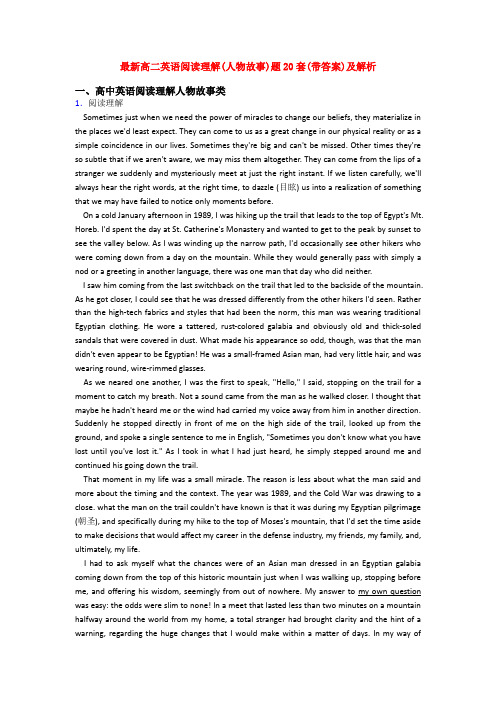
最新高二英语阅读理解(人物故事)题20套(带答案)及解析一、高中英语阅读理解人物故事类1.阅读理解Sometimes just when we need the power of miracles to change our beliefs, they materialize in the places we'd least expect. They can come to us as a great change in our physical reality or as a simple coincidence in our lives. Sometimes they're big and can't be missed. Other times they're so subtle that if we aren't aware, we may miss them altogether. They can come from the lips of a stranger we suddenly and mysteriously meet at just the right instant. If we listen carefully, we'll always hear the right words, at the right time, to dazzle (目眩) us into a realization of something that we may have failed to notice only moments before.On a cold January afternoon in 1989, I was hiking up the trail that leads to the top of Egypt's Mt. Horeb. I'd spent the day at St. Catherine's Monastery and wanted to get to the peak by sunset to see the valley below. As I was winding up the narrow path, I'd occasionally see other hikers who were coming down from a day on the mountain. While they would generally pass with simply a nod or a greeting in another language, there was one man that day who did neither.I saw him coming from the last switchback on the trail that led to the backside of the mountain. As he got closer, I could see that he was dressed differently from the other hikers I'd seen. Rather than the high-tech fabrics and styles that had been the norm, this man was wearing traditional Egyptian clothing. He wore a tattered, rust-colored galabia and obviously old and thick-soled sandals that were covered in dust. What made his appearance so odd, though, was that the man didn't even appear to be Egyptian! He was a small-framed Asian man, had very little hair, and was wearing round, wire-rimmed glasses.As we neared one another, I was the first to speak, "Hello," I said, stopping on the trail for a moment to catch my breath. Not a sound came from the man as he walked closer. I thought that maybe he hadn't heard me or the wind had carried my voice away from him in another direction. Suddenly he stopped directly in front of me on the high side of the trail, looked up from the ground, and spoke a single sentence to me in English, "Sometimes you don't know what you have lost until you've lost it." As I took in what I had just heard, he simply stepped around me and continued his going down the trail.That moment in my life was a small miracle. The reason is less about what the man said and more about the timing and the context. The year was 1989, and the Cold War was drawing to a close. what the man on the trail couldn't have known is that it was during my Egyptian pilgrimage (朝圣), and specifically during my hike to the top of Moses's mountain, that I'd set the time aside to make decisions that would affect my career in the defense industry, my friends, my family, and, ultimately, my life.I had to ask myself what the chances were of an Asian man dressed in an Egyptian galabia coming down from the top of this historic mountain just when I was walking up, stopping before me, and offering his wisdom, seemingly from out of nowhere. My answer to my own question was easy: the odds were slim to none! In a meet that lasted less than two minutes on a mountain halfway around the world from my home, a total stranger had brought clarity and the hint of a warning, regarding the huge changes that I would make within a matter of days. In my way ofthinking, that's a miracle.I suspect that we all experience small miracles in our lives every day. Sometimes we have the wisdom and the courage to recognize them for what they are In the moments when we don't,that's okay as well. It seems that our miracles have a way of coming back to us again and again.And each time they do, they become a little less subtle, until we can't possibly miss the messagethat they bring to our lives!The key is that they're everywhere and occur every day for different reasons, in response to the different needs that we may have in the moment. Our job may be less about questioning the extraordinary things that happen in our daily lives and more about accepting the gifts they bring.(1)Why did the author make a pilgrimage to Mt Horeb in Egypt?A. He was in search of a miracle in his life.B. It was a holy place for a religious person to head for.C. He intended to make arrangements for his life in the future.D. He waited patiently in expectation of meeting a wise person.(2)What does the underlined part "my own question" refer to in paragraph 6?A. For what reason did the man stop before me?B. Why did the Asian man go to the mountain?C. What change would I make within a matter of days?D. What was the probability that others told us the right words?(3)Which of the following is closest in meaning to the underlined word "subtle" in paragraph 7?A. Apparent.B. Delicate.C. Precise.D. Sufficient.(4)The author viewed the meet with the Asian man as a miracle in his life in that ________.A. the Asian man's appearance had a deciding effect on his future lifeB. his words were in perfect response to the need he had at that momentC. what the Asian man said was abundant in the philosophy of lifeD. the Asian man impressed on him the worth of what he had possessed(5)What might be the best title for the passage?A. Can you recognize a miracle?B. Is a miracle significant to us?C. When might a miracle occur?D. Why do we need a miracle?(6)After the encounter of the Asian man, what will the writer probably do immediately?A. Continue walking up to the top of the mountain.B. Have a rest to refresh himself.C. Try to have a heart-to-heart conversation with the Asian man.D. Come down the mountain.【答案】(1)C(2)D(3)B(4)B(5)A(6)D【解析】【分析】本文是一篇记叙文,作者讲述了一次埃及朝圣时,爬到何烈山半山腰时,偶遇了一位正在下山的亚洲陌生人。
最新高一英语阅读理解(人物故事)真题汇编(含答案)含解析
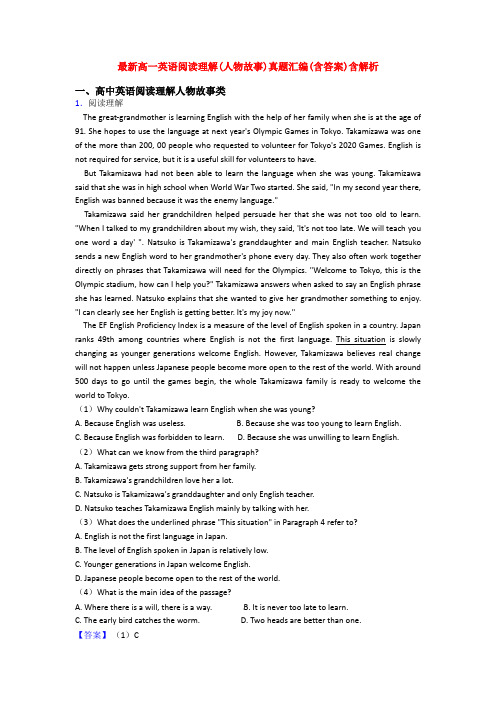
最新高一英语阅读理解(人物故事)真题汇编(含答案)含解析一、高中英语阅读理解人物故事类1.阅读理解The great-grandmother is learning English with the help of her family when she is at the age of 91. She hopes to use the language at next year's Olympic Games in Tokyo. Takamizawa was one of the more than 200, 00 people who requested to volunteer for Tokyo's 2020 Games. English is not required for service, but it is a useful skill for volunteers to have.But Takamizawa had not been able to learn the language when she was young. Takamizawa said that she was in high school when World War Two started. She said, "In my second year there, English was banned because it was the enemy language."Takamizawa said her grandchildren helped persuade her that she was not too old to learn. "When I talked to my grandchildren about my wish, they said, 'It's not too late. We will teach you one word a day' ". Natsuko is Takamizawa's granddaughter and main English teacher. Natsuko sends a new English word to her grandmother's phone every day. They also often work together directly on phrases that Takamizawa will need for the Olympics. "Welcome to Tokyo, this is the Olympic stadium, how can I help you?" Takamizawa answers when asked to say an English phrase she has learned. Natsuko explains that she wanted to give her grandmother something to enjoy. "I can clearly see her English is getting better. It's my joy now."The EF English Proficiency Index is a measure of the level of English spoken in a country. Japan ranks 49th among countries where English is not the first language. This situation is slowly changing as younger generations welcome English. However, Takamizawa believes real change will not happen unless Japanese people become more open to the rest of the world. With around 500 days to go until the games begin, the whole Takamizawa family is ready to welcome the world to Tokyo.(1)Why couldn't Takamizawa learn English when she was young?A. Because English was useless.B. Because she was too young to learn English.C. Because English was forbidden to learn.D. Because she was unwilling to learn English.(2)What can we know from the third paragraph?A. Takamizawa gets strong support from her family.B. Takamizawa's grandchildren love her a lot.C. Natsuko is Takamizawa's granddaughter and only English teacher.D. Natsuko teaches Takamizawa English mainly by talking with her.(3)What does the underlined phrase "This situation" in Paragraph 4 refer to?A. English is not the first language in Japan.B. The level of English spoken in Japan is relatively low.C. Younger generations in Japan welcome English.D. Japanese people become open to the rest of the world.(4)What is the main idea of the passage?A. Where there is a will, there is a way.B. It is never too late to learn.C. The early bird catches the worm.D. Two heads are better than one.【答案】(1)C(2)A(3)B(4)B【解析】【分析】本文是一篇记叙文,日本91岁的奶奶Takamizawa为了做好迎接在东京举行的2020奥运会的志愿工作,在孙辈的鼓励和帮助下开始学习英语。
高三英语阅读理解(人物故事)试题(有答案和解析)含解析

高三英语阅读理解(人物故事)试题(有答案和解析)含解析一、高中英语阅读理解人物故事类1.阅读理解A photography exhibition by French artist San Bartolome entitled Moon Door Dreamers opened in the 798 Art Zone in Beijing on December 10, 2011, presenting a cross-cultural perspective (视角) on ordinary life in the capital city.Bartolome took these photos in August 2008, and produced a video named Two Worlds, One Dream. These works were displayed in Pingyao, an ancient city in Shanxi Province, under the title Beijing Midsummer Night Dream in September 2010.The moon doors serve as a keyhole through which one can catch a glimpse of a slice of Beijing life. He got his inspiration from one cycling trip to the southeastern suburb of Beijing, where he discovered a peculiar street along which a gray brick wall was built to cover the shabby bungalows. These cabins were mostly rented by migrant workers- peddlers, craftsmen, grocers and innkeepers.Born in 1950, Bartolome has worked as a photographer, stage director. Artistic manager, writer and diplomat. A noted Sinophile, Bartolome frequently visits China for photographic subjects. In the fall of 2003, he joined the French Embassy in Beijing as a cultural attache. His work experience in China from 2003 to 2015 further enhanced his awareness of and love for China.Bartolome not only loves Chinese culture but also the Chinese people. He thinks that Chinese people are kind, welcoming and diverse.Back from his bike ride to southeastern Beijing, he decided to shoot pictures about ordinary urban lifestyles. He observed dwellers carefully and made friends with them.After about 30 days and nights that he spent with these common migrants, he created a number of portraits. Meanwhile, he learned more about those rural migrants who earn their living in a city with which they are unfamiliar.He adopted an optimistic perspective to shoot the sights, and he borrowed the title of one of William Shakespeare s comedy works: A Midsummer Night's Dream.(1)What is the main purpose of the exhibition?A. To present Bartolome's photographic skills.B. To tell us Bartolome's work experience in Beijing.C. To show us Bartolome's optimistic view on ordinary life in Beijing.D. To build a cross-cultural communication bridge between China and France.(2)What inspires Bartolome to shoot pictures about ordinary urban styles?A. His bike ride to Southeastern suburb of Beijing.B. His work experience in the French Embassy in Beijing.C. His visit to the ancient city of Pingyao.D. Shakespeare's comedy work: A Midsummer Night's Dream.(3)What does the underlined word "Sinaphile" in paragraph 4 refer to?A. A successful artist.B. A cultural attache.C. A person of status.D. A fan of China.(4)What does the text mainly talk about?A. A French artist tells Chinese stories with his camera.B. A French artist frequently visits China for photography.C. Migrant workers live a simple but happy life in Beijing.D. Moon Doors serve as a window to display China to the world.【答案】(1)C(2)A(3)D(4)A【解析】【分析】本文是一篇记叙文,法国艺术家圣巴托洛姆在北京798艺术区举办的名为"月亮之门梦想家"的摄影展,从跨文化角度呈现了普通城市的生活以及拍摄的原因。
高三英语阅读理解(人物故事)题20套(带答案)及解析
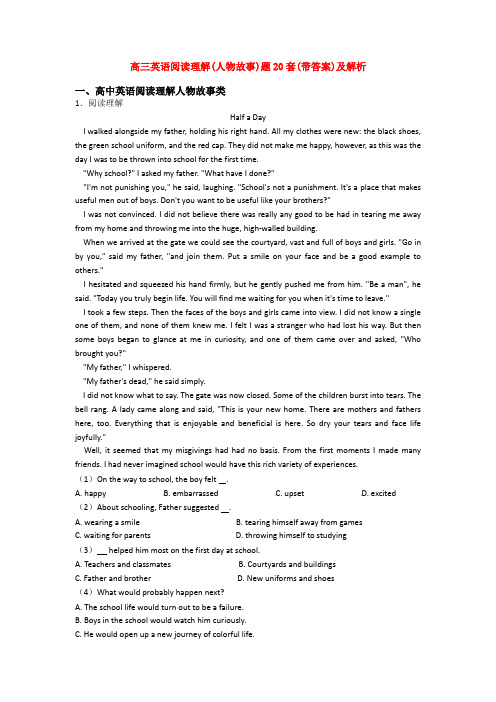
高三英语阅读理解(人物故事)题20套(带答案)及解析一、高中英语阅读理解人物故事类1.阅读理解Half a DayI walked alongside my father, holding his right hand. All my clothes were new: the black shoes, the green school uniform, and the red cap. They did not make me happy, however, as this was the day I was to be thrown into school for the first time."Why school?" I asked my father. "What have I done?""I'm not punishing you," he said, laughing. "School's not a punishment. It's a place that makes useful men out of boys. Don't you want to be useful like your brothers?"I was not convinced. I did not believe there was really any good to be had in tearing me away from my home and throwing me into the huge, high-walled building.When we arrived at the gate we could see the courtyard, vast and full of boys and girls. "Go in by you," said my father, "and join them. Put a smile on your face and be a good example to others."I hesitated and squeezed his hand firmly, but he gently pushed me from him. "Be a man", he said. "Today you truly begin life. You will find me waiting for you when it's time to leave."I took a few steps. Then the faces of the boys and girls came into view. I did not know a single one of them, and none of them knew me. I felt I was a stranger who had lost his way. But then some boys began to glance at me in curiosity, and one of them came over and asked, "Who brought you?""My father," I whispered."My father's dead," he said simply.I did not know what to say. The gate was now closed. Some of the children burst into tears. The bell rang. A lady came along and said, "This is your new home. There are mothers and fathers here, too. Everything that is enjoyable and beneficial is here. So dry your tears and face life joyfully."Well, it seemed that my misgivings had had no basis. From the first moments I made many friends. I had never imagined school would have this rich variety of experiences.(1)On the way to school, the boy felt .A. happyB. embarrassedC. upsetD. excited(2)About schooling, Father suggested .A. wearing a smileB. tearing himself away from gamesC. waiting for parentsD. throwing himself to studying(3) helped him most on the first day at school.A. Teachers and classmatesB. Courtyards and buildingsC. Father and brotherD. New uniforms and shoes(4)What would probably happen next?A. The school life would turn out to be a failure.B. Boys in the school would watch him curiously.C. He would open up a new journey of colorful life.D. His parents would accompany him at the school.【答案】(1)C(2)A(3)A(4)C【解析】【分析】本文是一篇记叙文,作者第一天去学校的时候并不开心,但是等他到了学校之后,他结交了很多朋友,开始了新的生活。
- 1、下载文档前请自行甄别文档内容的完整性,平台不提供额外的编辑、内容补充、找答案等附加服务。
- 2、"仅部分预览"的文档,不可在线预览部分如存在完整性等问题,可反馈申请退款(可完整预览的文档不适用该条件!)。
- 3、如文档侵犯您的权益,请联系客服反馈,我们会尽快为您处理(人工客服工作时间:9:00-18:30)。
最新高中英语阅读理解(人物故事)试题(有答案和解析)一、高中英语阅读理解人物故事类1.阅读理解Many people criticize today's newspapers as sensationalist, satisfying the public's abnormal curiosity. But journalism a century ago was just as notorious (臭名昭著). Publishers at that time routinely competed with each other for wild stories that could draw in the most readers. Meanwhile, it was an ideal atmosphere for a courageous reporter like Nellie Bly to spring into fame.Bly, whose name was Elizabeth Corcoran, had to work to make her way in the world. Different from many women of the time, however, she refused to let the working world scare her away. Her first big opportunity as a reporter came in 1885 after she wrote an angry letter denouncing the Pittsburgh Dispatch for an article it had run criticizing women forced to work outside the home. The interested and excited editor hired Bly for her "spirit," and soon she was investigating the situations of female factory workers. Bly cared less about their jobs than their lives after work - their amusements, their motivations, their fears and ambitions. She produced an article totally different from what other reporters of the time were writing: personal, thoughtful, meaningful.By 1887 Bly had a job with the New York World, one of the leader papers of the day. She quickly became famous for undercover stories about women in a mental hospital. Soon she had investigated life as a maid, a chorus girl, and even a street girl. In her best - known brave deeds, in 1890, Bly beat the famous "around the world in 80 days" trip Jules Verne had described in his novel. Traveling by steamship, train, even ricksha, Bly reported from each stop. A spellbound nation hung on every word. Only 25, Bly had become internationally famous.(1)Bly's first newspaper job was .A. with the New York WorldB. with the Pittsburgh DispatchC. to interview mental patientsD. to experience life of chorus girls(2)What does the underlined word "denouncing" in Para. 2 probably mean?A. Praising.B. Questioning.C. Informing.D. Condemning.(3)How did Nellie Bly gain world - wide fame?A. By criticizing Jules Verne.B. By competing with other reporters.C. By writing stories through investigation.D. By caring about women from different classes.(4)Which of the following best describes Nellie Bly?A. Daring and practical.B. Acute and confident.C. Critical and dependent.D. Calm and enthusiastic.【答案】(1)B(2)D(3)C(4)A【解析】【分析】本文是一篇记叙文,Bly是一名美国女记者,在那个记者都热衷于相互竞争而报道不实新闻特殊年代,她选择为女性说话。
为了能调查清楚事实,她扮成乞丐,女仆,神经病患者。
她不顾自己的工作甚至安危的态度,让她成了美国历史上著名的女记者。
(1)考查细节理解。
根据第二段中的"Her first big opportunity as a reporter came in 1885 after she wrote an angry letter denouncing the Pittsburgh Dispatch for an article it had run criticizing women forced to work outside the home. The interested and excited editor hired Bly for her "spirit,"可知,Bly写信谴责Pittsburgh dispatch的文章,却因为她的勇气被主编雇佣了。
故选B。
(2)考查词义猜测。
根据该句中的"angry letter" 可知她信的内容是批评Pittsburgh dispatch的文章。
A. Praising表扬;B. Questioning.质问;C. Informing.告知;D. Condemning.谴责选项中和批评相近的选项是condemn(谴责)。
故选D。
(3)考查细节理解。
根据最后一段中的"She quickly became famous for undercover stories about women in a mental hospital."她很快因为揭露精神病院女性的故事而名声大振)可知,Bly是因为报道女性故事而出名的。
故选C。
(4)考查推理判断。
根据第一段中的"a courageous reporter like Nellie Bly"可知她是勇敢的,再通过下文讲述她卧底去调查女性事件,说明她是实事求是的人。
故选A。
【点评】本题考点涉及细节理解,词义猜测和推理判断三个题型的考查,是一篇故事类阅读,考生需要准确捕捉细节信息,同时根据上下文的逻辑关系,进行分析,推理,从而选出正确答案。
2.阅读理解On March 25, 2010, Kate and David heard the words every parent dreads: Their newborn wasn't going to make it. Their twins-a girl and a boy-were born two minutes apart and 14 weeks premature, weighing just over two pounds each. Doctors had tried to save the boy for 20 minutes but saw no improvement. His heartbeat was nearly gone, and he'd stopped breathing. The baby had just moments to live."I saw him gasp (喘息), but the doctor said it was no use," Kate told the Daily Mail five years later. "I know it sounds stupid, but if he was still gasping, that was a sign of life. I wasn't going to give up easily."Still, the couple knew this was likely a goodbye. In an effort to cherish her last minutes with the tiny boy, Kate asked to hold him."I wanted to meet him, and for him to know us," Kate told Today. "We'd resigned ourselves to the fact that we were going to lose him, and we were just trying to make the most of those last, precious moments."Kate unwrapped the boy, whom the couple had already named Jamie, from his hospital blanket and asked David to take his shirt off and join them in bed. The first-time parents wanted their son to be as warm as possible and hoped the skin-to-skin contact would improve his condition. They also talked to him."We were trying to persuade him to stay," Kate told the Daily Mail. "We explained his name and that he had a twin that he had to look out for and how hard we had tried to have him." Then something miraculous happened. Jamie gasped again-and then he started breathing. Finally, he reached for his father's finger.The couple's lost boy had made it."We're the luckiest people in the world," David told Today.Eight years later, Jamie and his sister, Emily, are happy and healthy. The couple only recently told the kids the story of their birth. "Emily burst into tears," Kate said. "She was really upset, and she kept hugging Jamie. This whole experience makes you cherish them more."(1)What can we learn about the newborn babies?A. The boy's heart had stopped beating.B. The boy was 2 minutes older than the girl.C. The twins were born 14 weeks before the due date.D. The twins were expected to live for only 20 minutes.(2)When the couple knew they would lose the boy, they .A. begged the doctor to save himB. took his shirt off and then put him in bedC. wrapped him with his blanket to keep him warmD. talked to him and made close physical contact with him(3)What's the best title for the passage?A. The Power of Hug.B. The Miracle of Love.C. The Bond Between Twins.D. The Responsibility of Parents.【答案】(1)C(2)D(3)B【解析】【分析】本文是一篇记叙文,一对双胞胎出生时,医生告诉他们的父母男孩难以存活,只有几分钟的时间了。
